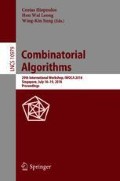Abstract
We investigate the polynomial-time learnability by using examples and membership queries. Angluin and Kharitonov [1] proved that various concept classes (e.g., Boolean formulae, non-deterministic finite automata) are not polynomial-time learnable in this learning model based on a public-key encryption scheme with a certain security (i.e., IND-CCA1). As a stronger learning model, we consider an a posteriori query learning model, and show that it is indeed stronger than the above learning model if a one-way function exists. Nevertheless, from a secure encryption scheme, we prove that many natural classes containing Boolean formula concept class is not polynomial-time learnable even in this stronger learning model. The security of an encryption scheme used in this paper is weaker than the one used by Angluin and Kharitonov.
Access this chapter
Tax calculation will be finalised at checkout
Purchases are for personal use only
Notes
- 1.
Let n be the length of input. \(NC^i\) is the class computed by a family of polynomial size and \(O(\log ^i(n))\) depth circuits with bounded fan-in, and \(AC^i\) is the similar class except that gates are allowed to have unbounded fan-in.
References
Angluin, D., Kharitonov, M.: When won’t membership queries help? J. Comput. Syst. Sci. 50(2), 336–355 (1995)
Goldreich, O.: Foundations of Cryptography: Volume 2, Basic Applications. Cambridge University Press, New York (2004)
Goldwasser, S., Micali, S., Rivest, R.L.: A digital signature scheme secure against adaptive chosen-message attacks. SIAM J. Comput. 17(2), 281–308 (1988)
Haussler, D., Kearns, M., Littlestone, N., Warmuth, M.K.: Equivalence of models for polynomial learnability. In: Proceedings of the First Annual Workshop on Computational Learning Theory, pp. 42–55 (1988)
Impagliazzo, R., Luby, M.: One-way functions are essential for complexity based cryptography. In: Proceedings of the 30th Annual Symposium on Foundations of Computer Science, pp. 230–235 (1989)
Pitt, L., Warmuth, M.K.: Prediction-preserving reducibility. J. Comput. Syst. Sci. 41(3), 430–467 (1990)
Rompel, J.: One-way functions are necessary and sufficient for secure signatures. In: Proceedings of the Twenty-Second Annual ACM Symposium on Theory of Computing, pp. 387–394 (1990)
Schapire, R.E.: The strength of weak learnability. Mach. Learn. 5(2), 197–227 (1990)
Stern, J., Pointcheval, D., Malone-Lee, J., Smart, N.P.: Flaws in applying proof methodologies to signature schemes. In: Yung, M. (ed.) CRYPTO 2002. LNCS, vol. 2442, pp. 93–110. Springer, Heidelberg (2002). https://doi.org/10.1007/3-540-45708-9_7
Valiant, L.G.: A theory of the learnable. Commun. ACM 27(11), 1134–1142 (1984)
Author information
Authors and Affiliations
Corresponding author
Editor information
Editors and Affiliations
Rights and permissions
Copyright information
© 2018 Springer International Publishing AG, part of Springer Nature
About this paper
Cite this paper
Nanashima, M. (2018). Cryptographic Limitations on Polynomial-Time a Posteriori Query Learning. In: Iliopoulos, C., Leong, H., Sung, WK. (eds) Combinatorial Algorithms. IWOCA 2018. Lecture Notes in Computer Science(), vol 10979. Springer, Cham. https://doi.org/10.1007/978-3-319-94667-2_24
Download citation
DOI: https://doi.org/10.1007/978-3-319-94667-2_24
Published:
Publisher Name: Springer, Cham
Print ISBN: 978-3-319-94666-5
Online ISBN: 978-3-319-94667-2
eBook Packages: Computer ScienceComputer Science (R0)

